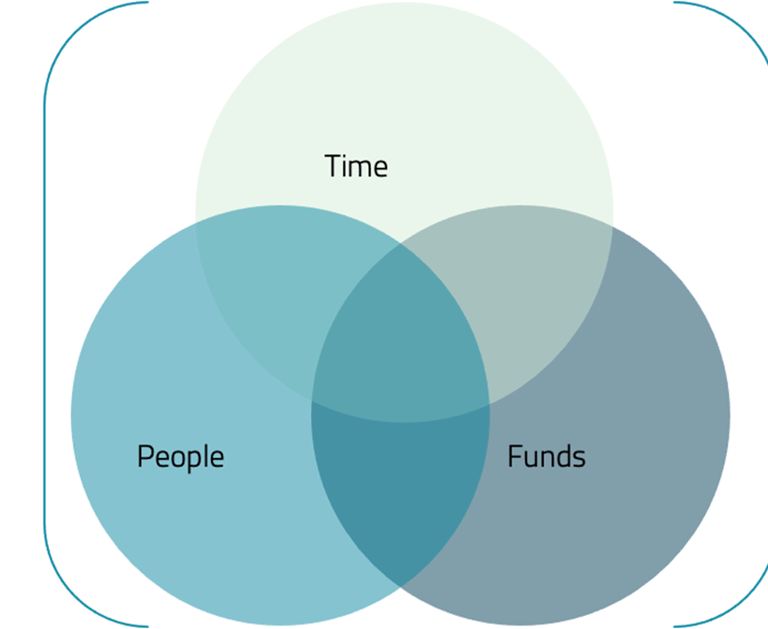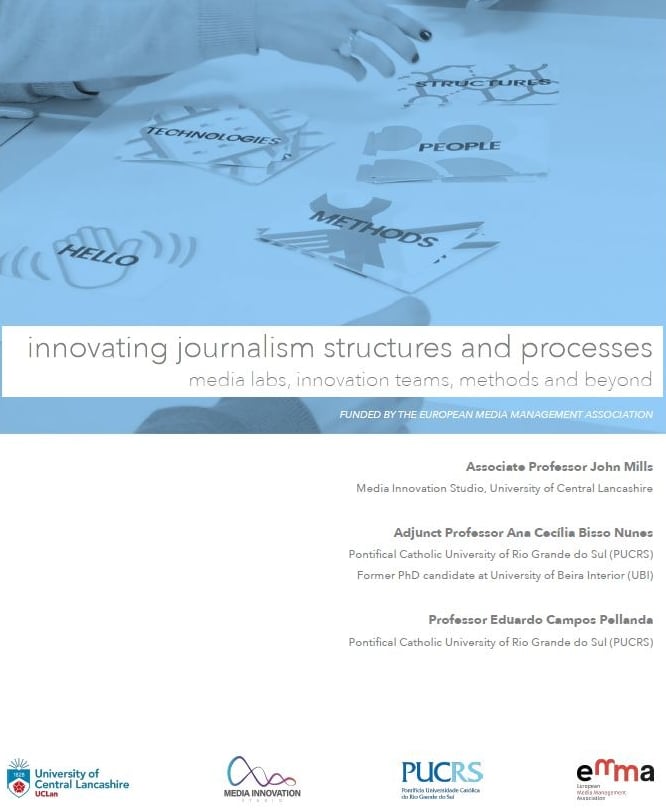Top-level findings
By exploring innovation methods, processes and roles within news media organisations across Europe and Latin America, the team considered the wider ecosystem, investigating a sample of media innovation funders to better understand their role approaches and impact.
Our findings suggest three top level insights: People, Social and Strategic Maturity.
These are supported by the sub-themes of People, Methods, Functions [pathways to goals], Motivations, Barriers, Management and Outputs. We also share brief findingsaround funders and their contribution to the journalism innovation ecosystem, although this pilot study is less developed.
PEOPLE
‘MAKE INNOVATION HAPPEN'
deploying innovation in an interdisciplinary context
Innovation (and product) managers are utilised to ‘make innovation happen’ Interdisciplinary teams are purposefully created and deployed to ‘innovate’. These teams can be permanentor temporary convened around a project goal.
Hiring of external bespoke skills were required to meet the requirements of innovation projects and goals.
Journalists working with innovation are demanded to learn and develop new skills.
Beyond technology and hard skills, active listening, mobilising people, empathy and communication are central characteristics of innovation practitioners, who have also to be able to embrace change.


METHODS
USER-CENTRED APPROACHES
driven by news product thinking
Product thinking and product development was a focus of innovation
User-centred approaches sprints and responding to analytic data emerged from the data
‘Rapid’ or ‘accelerated’ innovation methods were present, but were not seen as a panacea. These methods included design sprints, hackathons and others
Metrics span audience reach, product launch, cultural ‘presence’, strategic alignment
Audience needs are incorporated into the innovation process
Strategic development tools, such as ‘three horizons’, used to give longer term purpose and direction, although this was seen in a minority of organisations
In emergent levels of journalism innovation, innovation champions are key to spread and structure process in the organisation


FUNCTIONS:
PATHWAYS TO THE GOALS
EXECUTING, LEARNING AND FAILING
by looking beyond the norm
Scanning, scouting and measuring: innovation processes and structures are designed to look beyond the norm, exploring new tools, skills, technologies and approaches, and measuring their effectiveness
Executing ideas: innovation processes and structures are primarily configured to executing concepts, processes, products and technologies and…
Learning and failing: a key cultural difference was that innovation processes, individuals and teams were mandated to test, but also fail. A key outcome was learning
Aligning with strategic aims: in publishers with higher levels of innovation maturity, structures, processes and people were identified as being aligned. They were conscious of, overall organisation aims, vision and direction


MOTIVATIONS
JOURNALISTIC AND SOCIAL VALUES
to deal with digital challenges
A range of motivations were identified throughout the project, these included journalistic and social values, diversity of ideas and skills, democratic and public interest, business sustainability and the creation of impactful journalism


BARRIERS:
TIME, PEOPLE AND FUNDS
overlaping requirements
Inter-team communication – ensuring that relevant knowledge and skills from within and beyond the organisation were absorbed into the innovation process • physical and mental space, funding, and time away from pressures of delivery and to think about the future without endangering current commitments.
Time, people and funds are key and overlapping requirements for news innovation to emerge.
Innovation activities are orientated to overarching commercial strategy and journalistic values
Much innovation is immediate and ‘short-term’. A minority of publishers embed a longer-term perspective on research and development


MANAGEMENT AND OUTPUTS:
JOURNALISM' AND BUSINESS METRICS
evidence a demand for more holistic approaches
Outputs are not always strictly defined within a new product, tool or process. Improving an existing solutionand dealing/reacting to challenges of digital economy such as engaging or finding new audiences is a common goal for emergent innovation structures
Performance indicators can be defined product by product, especially in early stages of innovation structures
Innovation news products are still divided between journalism’ and business metrics, but innovation demands a more holistic approach.


FUNDERS:
INNOVATIVE JOURNALISM AND JOURNALISM INNOVATION
focusing social impact of media
Most funders focus on ‘innovative journalism’ and less so on ‘journalism innovation’
Focus on social impact of media (as independent media, disinformation and civic media) features as prioritized topics
Innovation is not explicitly addressed in most cases, even though it is indirectly related to their missions
Some funders are becoming increasingly aware of human-centred measures within applications; a number are adopting them themselves
Strengthening and building resilience within funded cohorts is key
Creating incubation and acceleration structures are a popular path
Defining and measuring performance indicators are challenging
Understanding impact is even more challenging


Innovation is PEOPLE:
dedicated and multidisciplinary skills, knowledge, agency and remit were identified throughout the ecosystem. Individuals with specific mandates to innovate, catalyse innovation were explicitly active
Innovation is SOCIAL:
Connections, networks and collaborations within organisations and beyond organisations
Innovation increasingly MATURE:
Markers for this include strategic alignment, processes, methods, measurement and a sense that innovators, teams and networks have track records of trying, failing, succeeding, iterating and learning from the process. This ensures an informed, and potentially more effective, decision making and action
PROJECT CONCLUSION
Industry report:
Funded by the European Media Management Association

